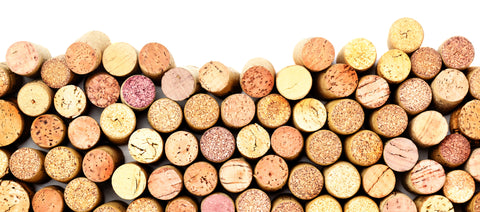Have you ever been asked to taste the wine in a restaurant, and you suspect it may be corked?
We shine a light on the whole issue of corked wines – what causes it, what corked wine tastes like and the difference between screwcaps, natural and synthetic corks.
What does a corked wine taste like?
We’ve all had the experience of tasting a glass of wine and realising that something is not quite right. There are several reasons why a wine may not be drinking at its best, but a corked wine has a very particular taste and aroma – that once identified is easy to spot. For most people, it’s a musty, dank smell with an unpleasant dryness on the palate. Others have equated it to everything from wet dog to damp basements.
A corked wine will not taste fruity and fresh but have a flatness or wateriness to it and little in the way of aroma. Some of us (yes me) are extremely sensitive to the smell of a corked wine – and humans in general can usually detect it in minute quantities. Once smelled, never forgotten!
What causes a wine to be corked?
The only thing that causes a wine to taste corked – is the cork itself. Traditional corks are made from the bark of a cork oak tree, or a Quercus Suber, and only harvested every 7 years. The cylindrical bit that we recognise as a cork is made from a section of the bark from the outside to the inside. Occasionally the tree itself becomes infected with a bacteria called Trichloroanisole or TCA for short – and it is these bacteria that taints the cork and then the wine. The industry average for corks containing TCA is around 3 or 4% so you can expect to come across them from time to time.
Can you tell if a wine is corked by sniffing the cork?
The answer is no. The only way to find out is by pouring a little wine into a glass, swirling it to release the aromas, smelling it to look for signs of mustiness and then sipping it. A cork may sometimes smell a little ‘corky’, but this does not mean the wine is tainted. It is also not a good idea to smell the top of the bottle as the wine should breathe a little before testing.
Is drinking corked wine bad for you?
Drinking corked wine will not do you any harm – but it doesn’t taste good.
There are bits of cork floating in my wine. Is it corked?
No. Sometimes corks break up and sometimes bits break up during the opening process. To resolve this, just pour it through a sieve and proceed as normal. If the wine itself does not smell of damp cardboard or a mouldy cellar, it will be fine.
Are all corks made from the Cork Oak tree?
No. Nowadays many vineyards choose to use one of the newer micro agglomerated corks which come in different forms at different prices – with the more expensive versions used in wines that need to be kept for longer. The best of these work in the same way as traditional corks but have no risk of TCA bacteria. Micro agglomerated corks are usually made using a mixture of natural cork particles or cork dust that is bound together using a plant-based binder and are natural and sustainable.
Many of our growers are moving towards using a high-end cork replacement made from sugar cane and patented as Normacorc. These plant-based corks have a lower carbon footprint than their synthetic counterparts and are both recyclable and carbon negative making them a popular choice for quality winemakers.
At the lower end of the scale – some big wine producers use plastic corks which are cost effective but environmentally problematic as we try to reduce single use plastics.
How about screwcaps?
Screwcaps were invented in Australia in 1964 by Peter Wall from Yalumba who was fed up with the high rate of corked wine he was experiencing at the time. The product was developed by a French company but wasn’t used commercially until the early 1980s. Many producers from Australia and New Zealand now use screw caps and it’s becoming increasingly common across the wine world.
There are many advantages to using a screw cap – not least the fact that the wine can never be tainted by TCA and subsequently ‘corked’. One big difference between corks and screwcaps is that corks allow a certain amount of oxygen to pass into the wine which has been thought of as a vital component of successful ageing. However, studies show that fine wines stored with screwcaps will also age well, if more slowly.
The area continues to be contentious within the industry – but for everyday drinking, it’s not the most important factor. I certainly enjoy a mixture as there are times when easy access is real bonus. It’s also practical for resealing wine to keep for the next day, or taking on picnics!
Shop our range of wines – screw tops, corks and Normacorcs alike!
Gruner Veltliner Kamptal DAC 2020 Weingut Waldschutz (Screwcap)
Cotes de Provence AOC 2020 Rosé Chateau La Vivonne (Normacorc)
Malbec Reservado 2020 Fabre Montmayou (Natural Cork)
Sauvignon Blanc IGP Val de Loire L’Explosif du Fresne 2018 Domaine du Fresne (Agglomerate Cork)




